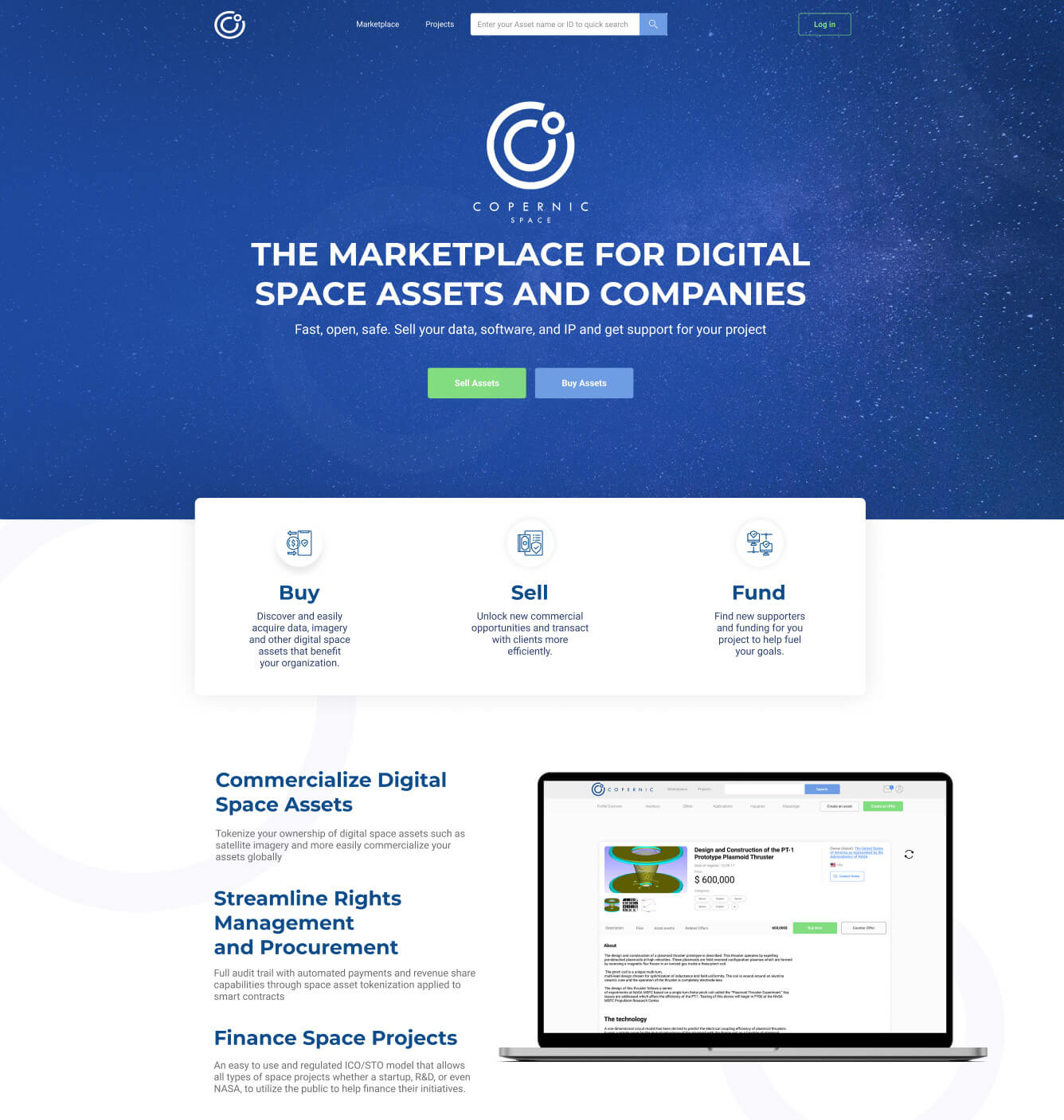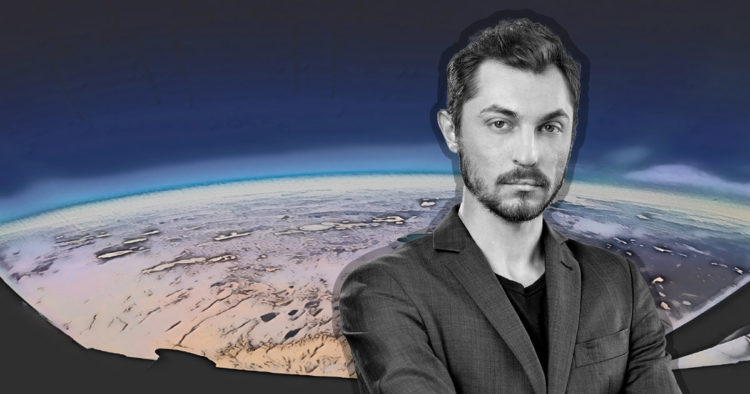CryptoSlate recently had the opportunity to chat with Grant Blaisdell, the founder and CEO of Copernic Space, a marketplace for “digital space assets and companies.”
Grant has been creating ventures at the intersection of new technologies and media in the US and Central Europe since his late teens. An early innovator in applying blockchain technology to various industries, companies Grant has co-founded include the leading Blockchain Analytics and AML company Confirm and the digital asset marketplace for the Space industry Copernic Space. As a lifelong musician and hip hop artist known as GB Savant, Grant also applies his technological work to his music with upcoming projects such as Mr. Crypto.
What is your professional background and how/when did you get into crypto?
I was in the LA startup and digital media space mainly focused on distribution and monetization models around digital content on mobile whether music or video. Bitcoin was already something I had heard about and had positive feelings towards based on my understanding and my viewpoint and value towards the world and its systems.
But I think most people have an “Aha” moment as to this technology, mine was around 2013 when I realized that applying this technology in certain ways can help alleviate a major issue I was looking to solve and that was centralized 3rd party platforms and middlemen that provided minimal transparency. I’m coming back around to my crypto roots recently as I’m becoming more and more involved in the digital media and music scene around this technology.
Tell us about why you decided to start Coinfirm?
Really what sits at the core of Coinfirm is providing the bridge between crypto and the mass economy and democratizing the AML market from high cost and low effectiveness to a highly effective near automated utility that a small startup to a major financial institution can use to properly cover their compliance needs for blockchain assets. We saw where we thought crypto was going and understood that for it to reach the point of any mass adoption that it would have to cross the regulatory challenge and more specifically the AML aspect.
On the flip side, our founding CEO and CIO have a deep background in AML, anti-fraud, and related analytics aspects and we understood that not only can we provide the AML bridge connecting crypto to the market but totally change the realities and effectiveness of AML overall. We took it from a high cost 2% effective process in the traditional financial industry and turned that into an easy to use near automated solution that works in 90 percentiles.
With our blockchain agnostic foundation, meaning the capability to technically integrate and analyze across blockchains, and a combination of many other competitive advantages we were quickly able to cement ourselves as an AML and analytics segment leader. Although we were really early and one of if not the first that focused on the AML challenge, our long-term vision is continuously being proven correct and we look forward to showcasing that further with our AMLT Oracle solution for DeFi and other solutions like ReclaimCrypto.
What are the biggest misconceptions about working full-time in crypto?
That its some sort of easy get rich quick market you can just enter and fly through. I’ve personally never been focused on the speculative aspect but more so the solution building and application part, so for me, I’m uniquely invested in the long haul and live and die by what I create.
Although the massive growing interest in the speculative element of crypto has its obvious positives, I think what people don’t see is the countless hours and amazing work being done by people all over the world in this space that is what will at the end of the day get crypto into the hands of a good portion of society whether they know it or not. I can’t tell you many people I’ve seen leave the “industry” as they get frustrated after BTC drops for an extended period etc.
What is your biggest frustration with the industry?
Selling blockchain as the solution and not selling solutions themselves. One thing is also something that has a positive side as well, which is this kind of ideological approach of many people, especially people that were very early. This has proliferated into the products they were pitching or selling and in my view clouded the reputation of other related players by association.
You can’t say hey I’m here to kill you and then sit down and try to work with them or sell them in. These things take time. Also the speculative focus relates to the above and then places the validity of the industry on the speculative rises and falls of the assets themselves.
What is your craziest crypto horror story?
As a Co-Founder of Coinfirm I got many internal views on “crypto horror stories”. But the hacks, the public scams, etc are much more visible, the true “conman” is operating in the shadows of this industry. There’s a bunch of blockchain project founders that have in total spent countless hours and time and even trips for a potential client or investor that ends up being a scam of a very high caliber.
I won’t go into details, but just know that there are organized companies marketed as investment firms with a constant array of switching but copied websites, names, and addresses in Switzerland. They consist of professional con men centralized between Switzerland and Italy that engage blockchain project founders they assume to hold significant crypto assets and then target them to eventually execute transactions that are simulated from their end but real from yours.
Tell us about your new venture, Copernic Space, and what problems it is aiming to solve?
Copernic Space is an NFT-based marketplace for digital space assets and companies. Copernic Space’s story starts three generations ago with my grandfather who was an aerospace professor for the national military academy in Poland. A free market capitalistic-minded guy behind the wall of communism, he began his writings around what we would call now the “democratization” of space based on the true struggle of access. The amazing intellectual capital and property being generated locally weren’t accessible to the West and vice versa.
This torch was picked up by my mother and handed to me with the beginning stages of our Copernic Space concept starting over 6 years ago. One thing I’ve learned through my various startup ventures, their successes, and failures, is that timing is of great importance, and at that point in time was blockchain technology not mature enough to create the features we felt were foundational for what was needed, but the mentality of the space industry itself wasn’t ready for what we’re attempting to do back then. Just now are these two points capable of aligning to birth a platform that serves to improve the efficiency and scale of the space industry as it is today, but also provide a new digital economy foundation for the space economy and its future.
Currently, in many cases the process to discover, acquire, and access satellite imagery, data, and what we call The Copernic Space marketplace will allow for digital space assets such as satellite data, imagery, EO, and more to be easily acquired and accessed in one place, unlocking a larger and more efficient market.

Space enterprises can better manage and monetize their digital space assets while the global market benefits from an easy way to discover and access them. With our SmartFund built side by side with the Marketplace, we’re providing the opportunity for projects to showcase themselves and garner funding from the public.
The entire platform is blockchain-powered and built on a tokenized (mainly NFT) and smart contract-based system, providing a transparent, democratized, and much more secure and efficient foundation for the space economy.
We just past our MVP stage and are applying a new UI while working directly with industry partners such as satellite imagery providers on direct commercial use cases and creating the Copernic Space Data Standard, which we’re building to finally create an acceptable standard across the market and help alleviate many of the issues facing it. Along with this process, we’re currently in a funding round that will take us to a public product and lead up to full market launch.
What other projects and/or blockchain developments are you most excited about?
I originally have that background in digital media and music, and I’ve actually stayed involved over the years in applying blockchain tech to that sphere, whether it be helping develop blockchain-based ticketing applications for the industry or something as simple as giving fans bitcoin at my concerts. So the truth is in general I’m heavily into taking digital forms of intellectual property and providing new ways for the creators to better own, protect, and monetize them.
Rarible has shown the great potential of just a sliver of that for example, while projects like ROCKI are applying it directly to music. Although obviously there is so much uncertainty, as usual, attributed to these next 10 years, but when it comes to crypto and further blockchain development it is going to be very exciting.
Do you have any blockchain and/or crypto predictions for 2021 and beyond?
Regulations, specifically AML aspects will enter DeFi soon. The debate around if/who/how to legally pursue true DEX and DeFi like structures and apply these regulations. I don’t like getting into the speculative and related predictive things in crypto, but as we’re still technically in the early stages of all of this, you are going to continue to see the ongoing extinction event of countless tokens, and more up and down waves around major asset pricing.
Along with that probably a few more “bitcoin is dead” articles But in general what we’re seeing in this run in my opinion is pushed by institutional players and companies coming in and is more akin to the .com bubble period although the ICO boom shared similarities to the .com period as well. The next run is going to be pushed by commercial implementations such as Copernic Space and some more mass-market applications around digital media for example. This run might not stop anytime real soon though with that said.
What are the biggest obstacles for the mainstream adoption of crypto?
Obviously regulatory uncertainty or just plain bad regulation. This is going to come in various waves, such as crypto in general, we saw it with ICOs, we’re gonna see it soon with DeFi. Entirely new models are being built and their true integration into segments of the economy will take time and continual waves. I also think that we have to differentiate what we see as the end “mainstream” adoption of crypto.
I’ve always thought that for the majority of people, who aren’t going to be really holding or treating cryptocurrencies as major investments, will be using cryptocurrencies and most likely not even know it.
One of the major obstacles for the mainstream adoption related to that is overall user experience and the exotic thought that regular users will be messing with complicated processes, private keys etc, and the products are going to start reflecting that along with more general adoption.
What is your most controversial opinion relating to blockchain and/or cryptocurrency?
Although I don’t think its technically controversial as it’s general truth for now, I love ethereum and view it as the foundational language of blockchain development, but I can’t trust it enough from a scalability and business end to fulfill what I need for true commercial applications based on it. The swings and high risk in stability and transaction costs are not something that an application that needs to provide true operational trust for companies can rely on.
Although it’s kind of painful to say, Ethereum sets the foundation for our blockchain development but is not going to be the blockchain we deploy the product on.
Connect with Grant Blaisdell
Like what you see? Subscribe for daily updates.
Credit: Source link












































































































































